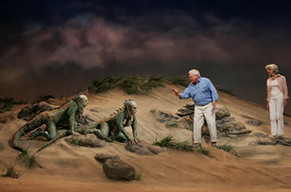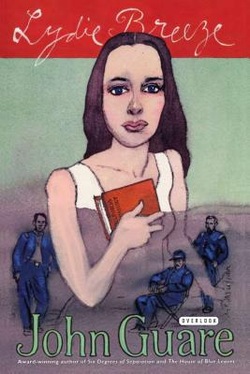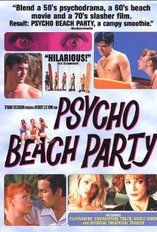
Yesterday, I provided readers with six titles to add to their summer reading lists. These additional recommendations serve as an addendum to Playbill.com's recently published list of recommended theater summer beach reads. While yesterday's recommendations were all non-fiction selections, today I would like to offer up a few great plays to be tossed into your beach bag.
Each of the recommendations is set, appropriately enough, at the beach.
1. Seascape by Edward Albee.
On a deserted stretch of beach a middle-aged couple, relaxing after a picnic lunch, talk idly about home, family and their life together. She sketches, he naps, and then, suddenly, they are joined by two sea creatures—lizards who have decided to leave the ocean depths and come ashore. Initial fear, and then suspicion of each other, are soon replaced by curiosity and, before long, the humans and the lizards (who speak admirable English) are engaged in a fascinating dialogue. The lizards, who are at a very advanced stage of evolution, are contemplating the terrifying, yet exciting, possibility of embarking on life out of the water; and the couple, for whom existence has grown flat and routine, holds the answers to their most urgent questions. These answers are given with warmth, humor and poetic eloquence, and with emotional and intellectual reverberations that will linger in the heart and mind long after the play has ended.
Each of the recommendations is set, appropriately enough, at the beach.
1. Seascape by Edward Albee.
On a deserted stretch of beach a middle-aged couple, relaxing after a picnic lunch, talk idly about home, family and their life together. She sketches, he naps, and then, suddenly, they are joined by two sea creatures—lizards who have decided to leave the ocean depths and come ashore. Initial fear, and then suspicion of each other, are soon replaced by curiosity and, before long, the humans and the lizards (who speak admirable English) are engaged in a fascinating dialogue. The lizards, who are at a very advanced stage of evolution, are contemplating the terrifying, yet exciting, possibility of embarking on life out of the water; and the couple, for whom existence has grown flat and routine, holds the answers to their most urgent questions. These answers are given with warmth, humor and poetic eloquence, and with emotional and intellectual reverberations that will linger in the heart and mind long after the play has ended.

2. Lydie Breeze by John Guare
PART ONE: BULFINCH'S MYTHOLOGY. The play begins on a deserted Nantucket beach in 1875 where the young Joshua Hickman awaits the return of his wife, Lydie, who has been off-island on a nursing assignment. She is furious that he has let her cherished gardenia plant wither and die in her absence while he is disheartened that the philosophical magnum opus on which he has labored for years has been rejected for publication. Their discord reflects on the failure of the utopian community they had sought to establish in the house left to Lydie by her whaling captain father, the only other remaining member being Amos Mason, a young man educated by Joshua who now talks of leaving to enroll at Harvard. When another former communard, Dan Grady, returns unexpectedly with an enormous amount of money that can make their dreams come true, the action quickens, as the old passion between Lydie and Dan is revived, and the jealous Joshua kills his rival. In the second act, Joshua, now in prison for murdering Dan, has written a memoir of what they tried to achieve. Amos, now a politically ambitious lawyer, feels his future will be put in danger by publication of Joshua's revelations. He offers Joshua freedom if Joshua will destroy his book.
PART TWO: THE SACREDNESS OF THE NEXT TASK. The hopes of this noble experiment had been destroyed by adultery, murder and suicide, and now those haunted by the tragedy gather to seek its expiation: the patriarch, Joshua Hickman, now pardoned for killing his wife's lover; his young daughter, Lydie, the namesake of her long-dead mother, a suicide; his oldest daughter, Gussie, the secretary-mistress of a U.S. Senator; and Jeremiah Grady, the long-lost son of the murdered lover. Moving from comedy to melodrama to tragic destiny as it untangles the twisted strands of their lives, the play illuminates both the undying optimism that underlies the American ethos and, through the metaphor of syphilis, the endemic corruption that, so often, can reach beyond its own time to subvert the cherished hopes of the future.
PART ONE: BULFINCH'S MYTHOLOGY. The play begins on a deserted Nantucket beach in 1875 where the young Joshua Hickman awaits the return of his wife, Lydie, who has been off-island on a nursing assignment. She is furious that he has let her cherished gardenia plant wither and die in her absence while he is disheartened that the philosophical magnum opus on which he has labored for years has been rejected for publication. Their discord reflects on the failure of the utopian community they had sought to establish in the house left to Lydie by her whaling captain father, the only other remaining member being Amos Mason, a young man educated by Joshua who now talks of leaving to enroll at Harvard. When another former communard, Dan Grady, returns unexpectedly with an enormous amount of money that can make their dreams come true, the action quickens, as the old passion between Lydie and Dan is revived, and the jealous Joshua kills his rival. In the second act, Joshua, now in prison for murdering Dan, has written a memoir of what they tried to achieve. Amos, now a politically ambitious lawyer, feels his future will be put in danger by publication of Joshua's revelations. He offers Joshua freedom if Joshua will destroy his book.
PART TWO: THE SACREDNESS OF THE NEXT TASK. The hopes of this noble experiment had been destroyed by adultery, murder and suicide, and now those haunted by the tragedy gather to seek its expiation: the patriarch, Joshua Hickman, now pardoned for killing his wife's lover; his young daughter, Lydie, the namesake of her long-dead mother, a suicide; his oldest daughter, Gussie, the secretary-mistress of a U.S. Senator; and Jeremiah Grady, the long-lost son of the murdered lover. Moving from comedy to melodrama to tragic destiny as it untangles the twisted strands of their lives, the play illuminates both the undying optimism that underlies the American ethos and, through the metaphor of syphilis, the endemic corruption that, so often, can reach beyond its own time to subvert the cherished hopes of the future.

3. Psycho Beach Party by Charles Busch
“Gidget”, Frankie and Annette beach party epics. and Hitchcock psychological suspense thrillers such as “Spellbound” and “Marnie” are given a shotgun marriage. Chicklet Forrest, a teenage tomboy, desperately wants to be part of the surf crowd on Malibu Beach in 1962. One thing getting in her way is her unfortunate tendency towards split personalities. Among them is a black check out girl, an elderly radio talk show hostess, a male model named Steve and the accounting firm of Edelman and Edelman. Her most dangerous alter ego is a sexually voracious vixen named Ann Bowman who has nothing less than world domination on her mind.
“Gidget”, Frankie and Annette beach party epics. and Hitchcock psychological suspense thrillers such as “Spellbound” and “Marnie” are given a shotgun marriage. Chicklet Forrest, a teenage tomboy, desperately wants to be part of the surf crowd on Malibu Beach in 1962. One thing getting in her way is her unfortunate tendency towards split personalities. Among them is a black check out girl, an elderly radio talk show hostess, a male model named Steve and the accounting firm of Edelman and Edelman. Her most dangerous alter ego is a sexually voracious vixen named Ann Bowman who has nothing less than world domination on her mind.
 RSS Feed
RSS Feed